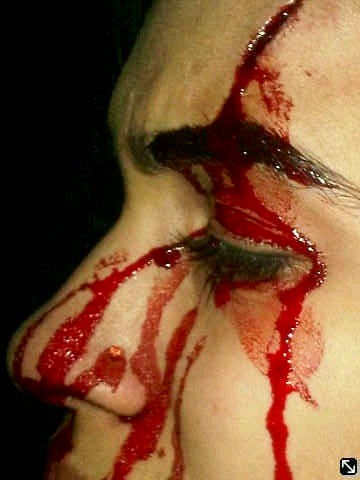Bahrain Homes turned into gas chambers by misuse of chemical gas
April 3, 2012 No Comments
Bahrain improving human rights one cracked head at a time
Bahrain: Crushing Pro-Democracy Protests. American and British Police Chiefs Step Up State Repression Top Western appointments allegedly aimed at improving human rights…
29 March, 2012 – by Finian Cunningham – Global Research
Two former police chiefs from the US and Britain have brought discernible Western “expertise” to the Bahraini force only weeks following their appointments – a surge in repression and state terrorism.
Former Miami police chief John Timoney and his British counterpart, John Yates, formerly commander at London’s Scotland Yard, were assigned last month by Bahrain’s royal rulers to “oversee reform” of the Persian Gulf kingdom’s security forces. Officially, the appointment of the American and Briton was to bring Western professional policing to the Bahraini force and specifically to upgrade the human rights record of Bahrain’s ministry of interior and National Security Agency.

Timoney left sips coffee while villages being attack with chemical gas
The assignments were announced by King Hamad Al Khalifa following a report by an international commission of inquiry into widespread human rights violations in the US-backed oil kingdom since pro-democracy protests erupted there last February.
As reported earlier by Global Research, the inquiry report and the subsequent appointment of the US and British police chiefs appeared to be a public relations exercise to burnish the tarnished image of this key Persian Gulf ally of Washington and London [1].
However, only weeks into their jobs, the Western commanders appear to have been given a remit that goes well beyond public relations, namely, to sharpen the repression against the pro-democracy movement.
Human rights activists and several political sources say that state forces have dramatically stepped up violence towards protesters and targeting of the Shia community generally. The diminutive island state of less than 600,000 nationals is comprised mainly of Shia muslims (70 per cent) who are ruled over by a Sunni elite installed by Britain when the kingdom gained nominal independence in 1971. American and British government support for the unelected Al Khalifa monarchy is viewed by the majority of Bahrainis as being at odds with their claims for democratic rights.
Over the past year, Bahraini state forces have killed some 50 people; thousands have been maimed, wounded and detained, many of the latter tortured. Proportionate to its population, such state violence is comparable to what Washington and London have loudly denounced the Libyan and Syrian regimes for – indeed mounting a military invasion of the former and threatening to do so in the latter – under the guise of “protecting human rights”. By contrast, there is hardly a word of denunciation from Washington or London towards the Bahraini regime, which hosts the US Navy’s Fifth Fleet. …more
April 3, 2012 No Comments
One size fits all talk of “Arab Spring” is an injustice
Bahrain’s uprising is more complex than the way it’s usually described.
Bahrain: One of Many Arab Springs
31 March, 2012 – Mitchell A. Belfer – M mathaba
The prevailing tendency to depict unrest in the Middle East as symptomatic of region-wide social and political injustice, exacerbated by suppression of dissent and a lack of democracy, is dangerously myopic. Using this template keeps observers from knowing the specific reasons for violent political demonstrations, by treating crowds as the rudderless, leaderless sum of their parts.
But crowds are not rudderless. They are governed — often by leaders who deliberately misremember the past in order to misconstrue the present, for better or worse — and those who govern them must be held accountable for their actions, especially when human life is sacrificed. So despite strong desires to forgive “unthinking crowds” for waves of destruction, especially when carried out for “progressive” reasons, individual accountability is key.
Too many political activists are allergic to self-reflection and tend to deflect calls for dialogue and moderation. They prey on the truth — manufacturing convenient politics with modern technologies and shrewd imaginations — to fulfill their own larger objectives. This has resulted in the proliferation of serial revolutionaries who upload decontextualized or manipulated pictures and videos to the Internet. Owing to the moral (and financial) austerity of many news agencies, such uploads are accepted, replayed with only scant warning that “independent verification” is impossible.
Within such a climate, how can accuracy be restored, and accountability applied, to balaclava-clad warriors who occupy the stern of revolutionary movements? The key is to deconstruct each crowd, reveal those individuals whose objectives are gaining power for themselves, and force them to practice democracy — not the democracy of votes, but of public accountability. Elections are just a part of democracy, dwarfed by bonds of social trust and a stable civil society. There can be no democracy without civil society, and civil society cannot exist in an atmosphere of political violence.
A criminalization of political violence must therefore be instituted, weighing each action on its merit so that assault is treated as assault, murder as murder, and arson as arson. In the Middle East, too many morally dubious actions are routinely categorized as legitimate political expressions, or suppressions, instead of crime. Whether committed by demonstrators or members of a state’s security forces, crime must be recognized as crime.
As these points become more widely grasped, broadly depicting Arab unrest as a “Spring” is becoming passé, and each demonstration has started to be viewed within its specific context. Members of crowds are finally being distinguished to see who is an honest demonstrator for economic and political reform, who is a radical, who is being manipulated by external actors, who is a criminal, and who a victim of circumstance.
Still, many in the media have not gotten the message. Misplaced shock accompanies reports that Libya’s Benghazi or Misurata crowds have been infiltrated by al-Qaeda, and that the Syrian opposition is actually a motley crew of radical ethno-religious movements. Few have publicly explored the segregation of men and women in Bahrain’s demonstrations, or the tribal nature of those in Yemen. Few have sought to identify the members of demonstrations to understand the essence of what is actually occurring. …more
April 3, 2012 No Comments
French Chemical Gas deployed against Bahrain portesters
Bahrainis protest against use of tear gas
29 March, 2012 – France 24
AFP – Hundreds of Bahrainis staged on Thursday a sit-in outside the offices of the United Nations demanding action over the “excessive” use by police of tear gas against protesters.
Protesters gathered outside the UN house in Manama, in a rally organised by the Shiite-led opposition, according to a statement by Al-Wefaq, the main opposition formation.
Police are regularly clashing with protesters who take to the streets in Shiite villages despite last year’s brutal crackdown on a month-long protest that demanded democratic change in the Sunni-ruled Gulf monarchy.
Protesters, including men and women, wore medical masks and carried used tear gas canisters of the type reportedly used by police to disperse demonstrations, according to pictures provided by the opposition.
Dozens of used tear gas canisters were also piled up by the protesters outside UN offices, the pictures showed.
Protesters chanted slogans demanding the international community to “take a stance against those crimes, and dangerous violations by Bahraini authorities against unarmed” people, said the statement.
Representatives of the opposition delivered a letter addressed to UN Secretary General Ban Ki-Moon demanding action.
“This excessive use (of tear gas) is a daily flagrant violation to the UN’s Basic Principles on the Use of Force and Firearms by Law Enforcement Officials,” the letter said.
The UN High Commissioner for Human Rights last week criticised Bahraini forces for their “disproportionate use of force” as they sought to quell protests, saying their use of tear gas may have led to over 30 deaths.
“We have been receiving worrying reports of the disproportionate use of force by Bahraini security forces, including the excessive use of tear gas, the use of birdshot pellets and rubber bullets,” said spokesman Rupert Colville. …source
April 3, 2012 No Comments
Support Bahrain Don’t Come to the F1
April 3, 2012 No Comments
The Revoltuion Since 14 February, 2011
April 3, 2012 No Comments
































